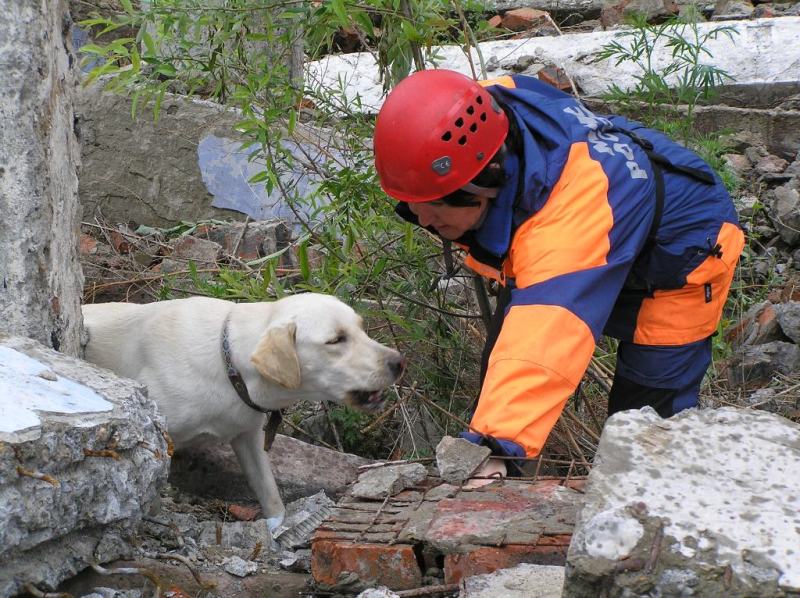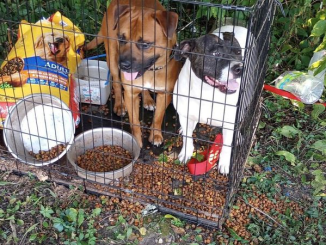Results indicated that not only can dogs detect Covid faster, but they can also do so in a non-intrusive manner – so no need to swab your throat or nose

Dogs can detect Covid-19 faster and more accurately than a PCR test, a new study shows.
Researchers looked at the ability of canines to recognise the virus and its variants, even when they are obscured by other viruses, like those from common colds and flu.
More than 400 scientists from over 30 countries contributed to the study as well as 147 scent dogs, according to the findings published in the Journal of Osteopathic Medicine.
After analysing many studies covering both field and clinical experiments, Professor Dickey and Junqueira found that dogs who are trained to sniff out scents are “as effective and often more effective” than antigen tests.
A total of 53 dogs were trained to sniff out Covid scents, while 37 were not and scientists found that the dogs that were not trained were in some cases “slightly superior” to those that were pre-trained.
“The previously untrained dogs have the advantage that they are not as prone to indicating on scents other than the Covid–19 associated scent,” the paper said.
The results indicated that not only can dogs detect Covid faster, but they can also do so in a non-intrusive manner. This means you won’t need to put a swab in your throat or nose.
How can dogs detect the virus?
This essentially comes down to the dog’s highly evolved nose with its ability to sense out smells quicker.
Dogs possess up to 300 million olfactory receptors in their noses, compared to about six million in humans. And the part of a dog’s brain that is devoted to analysing smells is about “40 times greater” than humans. Canines also have ‘neophilia’, which means they are attracted to new and interesting odours
And so, with all these enhancements, dogs can detect very low concentrations of odours associated with Covid infections.
“They can detect the equivalent of one drop of an odorous substance in 10.5 Olympic-sized swimming pools,” Professor Dickey said. “For perspective, this is about three orders of magnitude better than with scientific instrumentation.”
Scientists also found that in some cases, the animals were also able to detect the virus in pre-symptomatic and asymptomatic patients, “whose viral load was too low for conventional tests to work.”
Professor Dickey has said that dogs can also differentiate Covid and its different variants in the presence of other respiratory viruses. This included the common cold or flu.
“They’re much more effective. In fact, one of the authors that we quote in the paper commented that the RT-PCR test is not the gold standard anymore. It’s the dog. And they’re so quick,” he added. “They can give you the yes or no within seconds if they’re directly smelling you.”

How was the study conducted to see if dogs can really detect Covid-19?
In some studies, the dogs gave a person a quick sniff, sitting down to see if the person has Covid. In another study, the dog was given a sweat sample to smell for a few minutes.
The press release has said that scent dogs, such as beagles, basset hounds and coonhounds are the ideal candidates for sniffing out the virus, given their “natural tendencies to rely on odours to relate to the world.”
But the studies which the researchers analysed showed a variety of dogs were up for the challenge and were able to sniff out the Covid odour. With a few weeks of training, puppies, older dogs, purebred and mixed breeds, both male and female were able to sniff such odours out and “all performed admirably,” the Eureka Alert press release said.
Although there has been success with dogs detecting such viruses, researchers believe there are still many challenges with using dogs for medical diagnoses.
“There’s quite a bit of research, but it’s still considered by many as a kind of a curiosity,” said Professor Dickey.
In conclusion, Professor Dickey and Junqueira said after reviewing the studies, believe that scent dogs deserve “their place as a serious diagnostic methodology that could be particularly useful during future pandemics, potentially as part of rapid routine health screenings in public spaces.”
“Perhaps, most importantly, we argue that the impressive international quality and quantity of COVID scent dog research described in our paper for the first time, demonstrates that medical scent dogs are finally ready for a host of mainstream medical applications,” they added.
A Shivering Pup’s Second Chance: The Riveting Water Tunnel Rescue

On the fateful day of July 11, an emotional rollercoaster unfolded, triggering a rapid response from both firefighters and dedicated RSPCA personnel. Their mission? To rescue a distressed dog from a perilous situation that sent shockwaves through the community.
The clock struck 2:45 PM when these heroes arrived on the scene, their hearts resolute to save the helpless pup.
Trapped and frightened, the dog had no means to break free, but the arrival of these devoted rescuers signaled a glimmer of hope in the midst of despair. Their meticulous efforts would pave the way for the triumphant liberation of the trembling canine, offering it the warmth and care it craved.

The rescue operation was a true spectacle, featuring a symphony of ladders, teamwork, and unwavering determination. These courageous souls worked tirelessly until the shivering dog was finally set free from its harrowing ordeal. Following this remarkable rescue, the dog found itself in the loving care of the Woodside RSPCA Animal Centre, where plans were set in motion to reunite the pup with its rightful owner.

As the firefighters and RSPCA heroes arrived at the scene, their hearts sank at the sight that greeted them—a weary, shivering dog submerged in the frigid waters of the culvert. It was evident that this loyal companion had endured an agonizing ordeal for far too long.
With the tender care and support provided by the Woodside RSPCA Animal Centre and the Leicestershire Fire and Rescue Service Loughborough Station, the dog was extracted from its dire predicament with utmost care and precision, immediately wrapped in warmth and comfort.
The Castle Donington Fire Station shared their feelings about the rescue, saying, “When we reached the scene, our hearts sank as we found the dog shivering in the cold water running through the culvert. It was clear that the poor pup had been there for quite some time. So with immense care and help from the Woodside RSPCA Animal Centre and Leicestershire Fire and Rescue Service Loughborough Station, we carefully extricated the dog from the culvert, providing immediate comfort and warmth. With RSPCA assistance, we made sure that this brave little soul was reunited with its owner.”

The intense rescue mission reached its conclusion around 3:20 PM, as confirmed by the Leicestershire Fire and Rescue Service.
This incident carries a poignant message for all dog owners, serving as a reminder to exercise caution when their beloved pets are in the vicinity of water bodies. The Castle Donington Fire Station underscored the importance of pet microchipping and discouraged individuals from venturing into the water to rescue their pets. Instead, they encouraged people to reach out to emergency services for assistance.
The touching rescue of the shivering dog from the water tunnel is a testament to the unwavering dedication and compassion of those who labored relentlessly to ensure the safety and well-being of this four-legged friend.



Leave a Reply